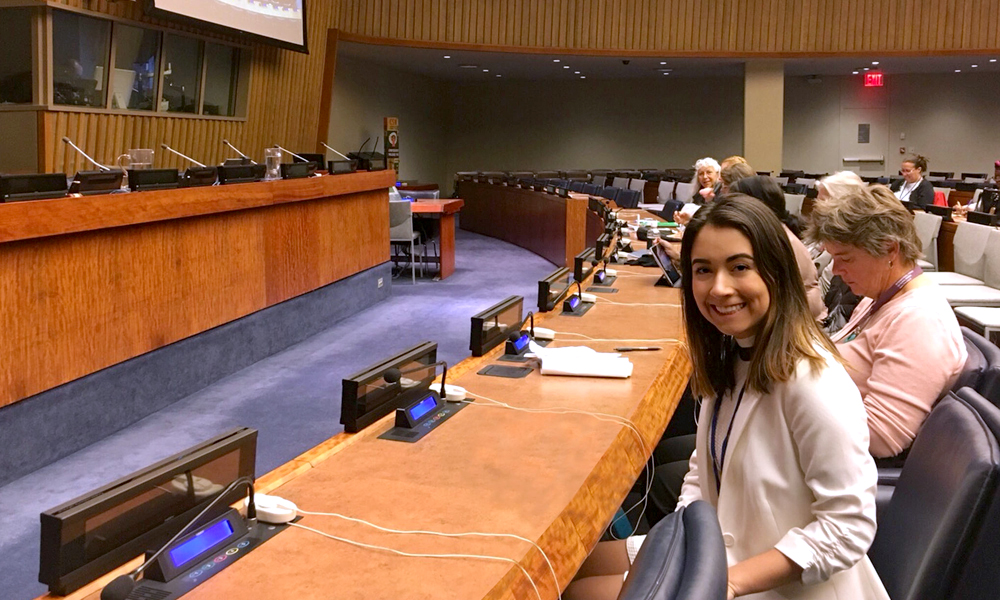Tarriers are People Who Make the World a Better Place
From Kindergarten to the United Nations, a lifelong Tarrier reflects on how CWA shaped her journey and lends advice to future Tarriers
By Maria Gonzalez ’19
I’ve been a Tarrier since kindergarten; having basically grown up on the Lower School playgrounds, tennis courts, and in the familiar comfort of the Upper School’s classrooms, it can be intimidating to think of leaving Charles Wright when I graduate this June. Yet there are certain things CWA has taught me that I know I’ll take with me to college: an immense love for learning, lofty goals to change the world, and passion—for writing, music, and Spanish, but above all, for social justice.
I’m not quite sure when I first heard the term “social justice,” but if I had to guess, it would be in my ninth grade civics class. Civics was utterly fascinating to my 14-year-old self. My teacher, Ms. Susan Sparrow, posed challenging questions to the class: Is solitary confinement cruel and unusual punishment? How did Schmerber v. California clarify the Fourth Amendment? Is the Equal Access Act a violation of the Establishment Clause? My classmates and I debated these questions in lively mock trials or defended our theses in essays. Sometimes I argued my opinion, but just as often, at Ms. Sparrow’s suggestion, I chose to defend what I didn’t agree with. Approaching questions in this way helped me gain a better understanding of civic issues, and I began to grow more curious about the social issues faced around the globe.
Throughout the next few years at Charles Wright, I capitalized on every opportunity to learn more, aiming to open myself to new perspectives that could teach me about my community and the world. I attended the NWAIS Student Diversity Retreat, served in student government, and traveled to Bogotá, Colombia, during Winterim. I also conducted an independent research study on immigration and led a high school youth conference titled, “Mi casa es tu casa.” My teachers supported me throughout all of my endeavors, often writing letters of recommendation for outside programs, looking over essays, and arranging mock interviews. By 11th grade, I’d formulated strong opinions on international social justice issues, and in part thanks to the ethical teachings I’d grown up on in Lower School Chapel, I had determined it was my responsibility to seek change.
Junior year was exciting: Early in the fall, I received notice that I had been selected to serve as Senator Patty Murray’s page in the U.S. Senate Page Program. The time commitment was six months—January to June —in Washington, D.C., and after speaking to my college counselor, I was prepared to venture off to the capitol. Days later, I received a call from the headquarters of the Episcopal Church. Presiding Bishop Michael Bruce Curry had selected me to represent the church at the United Nations Commission on the Status of Women (UNCSW), where I was to speak on gender equality. I was shocked, to say the least: I had submitted the application despite being two years younger than the 18-year requirement. My excitement faded, however, when I learned that, per Senate rules, I couldn’t leave the page program to attend UNCSW in New York. I consulted my teachers when deciding which opportunity to pursue, and my path became abundantly clear.
The most important thing Charles Wright has taught me is social responsibility. I believe Tarriers are people who make the world a better place, whether that means planting trees at L’Arche Farm or remembering to thank the unsung heroes in our own CWA community. Keeping this in mind, I knew that speaking to gender equality at the United Nations was the best way I could do my part to—as cheesy as it sounds—help save the world.
After months of conference calls and strategy meetings, I arrived at the United Nations in March, ready to tackle complex issues of equality and learn as much as I could from the experience. I barely slept for the next two weeks, spending hours in meetings, editing draft resolutions, and, yes, studying for the finals I was missing at school. Years’ worth of public speaking projects at CWA—my fifth grade report on Abigail Adams, recitation of the Gettysburg Address in Ms. Jenise Petrich’s history class, and comparaciones culturales in AP Spanish—enabled me to carry easy conversations with Spanish-speaking delegates, ask the Secretary-General questions in front of hundreds of people, and speak articulately on gender equality. UNCSW had a profound impact on my world view. I heard stories that were sometimes hopeful, yet more often heartbreaking. These stories served as incentive for my work at the 79th General Convention of the Episcopal Church a few months later, in Austin, Texas. There, I addressed over 1,300 bishops, deputies, clergy, laity, and press in English and Spanish regarding the issues that our world faces. The question I posed to them was: “How do we teach love?”
As I head off to college, I hope to find an answer to that question. I’m nervous about journeying into the unknown, but I’m also excited to travel, meet new people, and share with others the love and kindness that CWA has always shown me—and continually shows its students. Before I begin this journey, I’d like to offer some advice to Tarriers, both new and old: Take advantage of every opportunity. Take advantage of the wonderful education you’ve been given, because it’s truly the greatest gift in the world. Form meaningful relationships with your teachers and classmates; they will always be your family. Don’t hesitate to speak up for what you believe in, but be just as prepared to listen and learn from those around you. Have courage, use your voice for good, and always remember that Tarriers are people who make the world a better place. //

